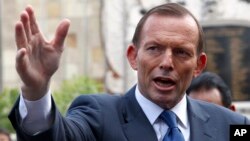Indonesia has announced that it is suspending military and intelligence cooperation with Australia, a traditional ally, following allegations that Australian spies listened in on the phone calls of senior Indonesian officials.
The move was made public Wednesday in a nationally televised address by President Susilo Bambang Yudhoyono, whose phone calls were among those reported to have been intercepted.
President Yudhoyono said he wants to maintain good relations with Australia, but that the two countries cannot work together on military and intelligence activities until the spying scandal is resolved.
"I take this case seriously. I believe it is not permitted for other countries to tap [the communications of] officials, according to Indonesia law, Australia law, even international law. It violates human rights," said Yudhoyono.
Among the areas to be affected by the move are people smuggling operations, joint military training programs, and combined maritime patrols. It is not clear when the suspension will begin.
Australian Prime Minister Tony Abbott has refused to apologize for the spying allegations, which surfaced in a series of reports based on secret memos leaked by ex-U.S. intelligence contractor Edward Snowden.
Speaking to parliament earlier Wednesday, Prime Minister Abbott repeated his statements of "deep and sincere" regret for the embarrassment caused to Yudhoyono, but also warned against overreacting to the issue.
"My intention, notwithstanding the difficulties of these days, is to do everything I reasonably can to help to build and strengthen the relationship with Indonesia, which is so important for both our countries," said Abbott.
Australia has refused to confirm whether the spying took place, buy Abbott has insisted that such information gathering is not unusual and is used to help Australia's allies.
Indonesia has rejected this explanation. President Yudhoyono on Tuesday took to Twitter to directly accuse Abbott of belittling the allegations and refusing to show enough remorse.
The spying allegations first appeared in reports by the Australian Broadcasting Corporation and The Guardian newspaper.
The reports said Australian intelligence agents tracked activity on the mobile phone of Indonesian President Yudhoyono for 15 days in 2009. At least one of the president's calls was said to have been intercepted. The news agencies also said the phones of Yudhoyono's wife, Kristiani Herawati, and eight other government officials, were targeted.
Even before the latest allegations surfaced, Australia-Indonesia relations had been under strain. Last month, Indonesia summoned the Australian ambassador in Jakarta to complain about media reports claiming the Australian embassy was part of a vast U.S.-led surveillance network.
Abbott has also upset many Indonesians by ordering his government to turn boats of Australia-bound asylum seekers back to Indonesia. He introduced the policy after taking office in September.
The move was made public Wednesday in a nationally televised address by President Susilo Bambang Yudhoyono, whose phone calls were among those reported to have been intercepted.
President Yudhoyono said he wants to maintain good relations with Australia, but that the two countries cannot work together on military and intelligence activities until the spying scandal is resolved.
"I take this case seriously. I believe it is not permitted for other countries to tap [the communications of] officials, according to Indonesia law, Australia law, even international law. It violates human rights," said Yudhoyono.
Among the areas to be affected by the move are people smuggling operations, joint military training programs, and combined maritime patrols. It is not clear when the suspension will begin.
Australian Prime Minister Tony Abbott has refused to apologize for the spying allegations, which surfaced in a series of reports based on secret memos leaked by ex-U.S. intelligence contractor Edward Snowden.
Speaking to parliament earlier Wednesday, Prime Minister Abbott repeated his statements of "deep and sincere" regret for the embarrassment caused to Yudhoyono, but also warned against overreacting to the issue.
"My intention, notwithstanding the difficulties of these days, is to do everything I reasonably can to help to build and strengthen the relationship with Indonesia, which is so important for both our countries," said Abbott.
Australia has refused to confirm whether the spying took place, buy Abbott has insisted that such information gathering is not unusual and is used to help Australia's allies.
Indonesia has rejected this explanation. President Yudhoyono on Tuesday took to Twitter to directly accuse Abbott of belittling the allegations and refusing to show enough remorse.
The spying allegations first appeared in reports by the Australian Broadcasting Corporation and The Guardian newspaper.
The reports said Australian intelligence agents tracked activity on the mobile phone of Indonesian President Yudhoyono for 15 days in 2009. At least one of the president's calls was said to have been intercepted. The news agencies also said the phones of Yudhoyono's wife, Kristiani Herawati, and eight other government officials, were targeted.
Even before the latest allegations surfaced, Australia-Indonesia relations had been under strain. Last month, Indonesia summoned the Australian ambassador in Jakarta to complain about media reports claiming the Australian embassy was part of a vast U.S.-led surveillance network.
Abbott has also upset many Indonesians by ordering his government to turn boats of Australia-bound asylum seekers back to Indonesia. He introduced the policy after taking office in September.
